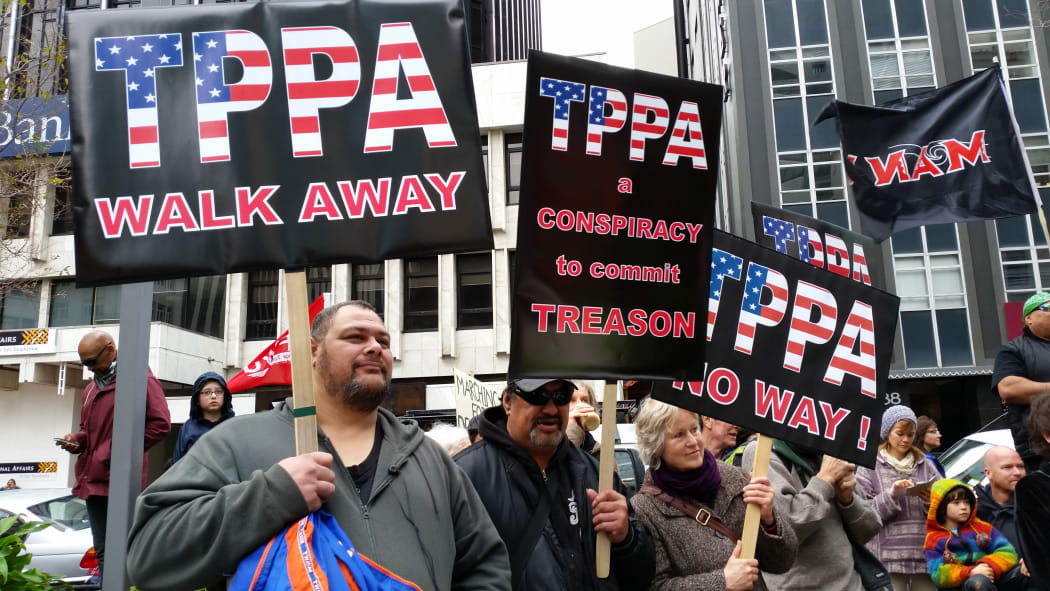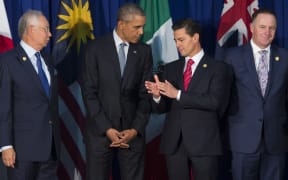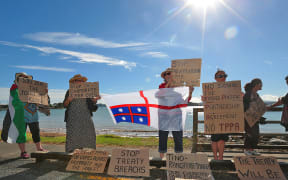The controversial Trans-Pacific Partnership (TPP) agreement will be signed tomorrow in Auckland.

Anti-TPP protesters carrying anti-corporation slogans and signs prepare to march to Parliament in Wellington (file). Photo: RNZ
Opponents of the deal argue it will undermine New Zealand's sovereignty, and is more far-reaching than any previous trade deal the country has signed.
Read RNZ Economics Correspondent Patrick O'Meara's FAQs on the TPP

Professor Jane Kelsey Photo: RNZ / Kim Baker Wilson
A long-time opponent of the TPP, Professor Jane Kelsey, said the investment chapter in the TPP went much further than in any other agreement.
"You're looking at empowering more than 1000 US corporations that are notoriously litigious, to be able to use the provisions at a time when countries around the world are actually looking at how to extract themselves from the exactly the same obligations."
Investor State Dispute Settlement (ISDS) provisions allow a corporation to take legal action against a foreign government for introducing legislation that harms their investment.
Chapman Tripp partner Daniel Kalderimis said ISDS provisions were included in four other trade agreements that New Zealand was already signed up to. Those deals all had the same set of investor rights, he said.
"There's no substantive different there, in fact the TPP in many ways has more carve-outs than some of those earlier agreements.
"The first one is that tobacco claims can be excluded from this agreement in a way that they couldn't in previous ones, and there's a specific rule that says that one can't bring claims for breach of overseas investment-type regulations."
Mr Kalderimis said, despite those carve-outs, it was still quite possible a case could be taken against the New Zealand government.
"Just like [the tobacco company] Phillip Morris took a case against Australia, but of course that can already be done under various agreements that we've signed.
"A US investor would simply have to structure their investment through an Asian country to get the benefit of that sort of protection, so if a US investor was adamant that they wanted that sort of protection before investing in New Zealand, they could already have it."
Ministry of Foreign Affairs and Trade deputy secretary David Walker was New Zealand's chief negotiator in the TPP talks. It was important to remember the ISDS provisions went both ways, he said.
"New Zealand has both a good regulatory system and also a good judicial system, so the government considers that, these sorts of arrangements, the balance of benefits are for opportunities for our investors should they run into difficulties overseas as opposed to the risk at the New Zealand end."
Mr Walker added that a series of roadshows, which would start in March, would show the public the deal was a good one and not as bad as some made out.
"It's a good opportunity, both to explain more to interested members of the public, but also for some of the business people to get into the nitty-gritty and understand what TPP will mean for them when it comes into force so they can prepare for that."
He said he did not expect any protests to disrupt tomorrow's signing, which will be carried out amid tight security at Auckland's Sky City.
Auckland University law professor Robert Scollay said there was a lot of discussion about whether the TPP would restrict progressive governments in the future - but there were a huge range of policies that would not be affected.
"Governments, both right-wing and left-wing, in the future will still be able to make social welfare benefits more or less generous, they will still be able to change the tax system to redistribute income to a greater extent, they'll still be able to spend more or less on education and state-provided health services.
"So it's probably one of the reasons why we won't see in practice major changes in our everyday life [as a result of the TPP]."
After tomorrow's signing, the 12 countries will have two years to ratify the agreement and pass domestic legislation to enable it.







